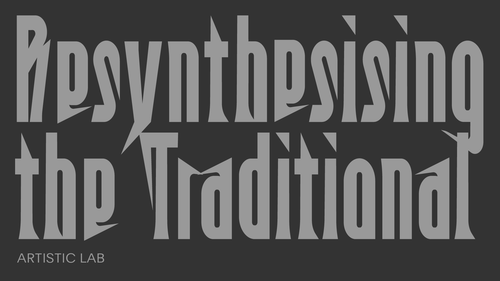
CTM 2025 Resynthesising the Traditional artistic lab fellows announced
The Resynthesising the Traditional artistic lab focuses on how traditional art forms and aesthetics can be reinterpreted within modern sound and performance, outside of (self-)exoticisation and the uneven power dynamics created by mass-cultural and other stereotypes.
Led by Susie Ibarra (US) and Stas Shärifullá (INT), lab fellows will engage in a weeklong lab that culminates in a public presentation on Sunday 2 February within CTM 2025 Festival.
Eight fellows were selected out of over 250 applications to the open call. Congratulations to: Anna Jurkiewicz (PL/AT), bela (KR/DE), Bilawa Respati (ID/DE), Marie Yevkiné Tirard (FR), Medina Bazarğali (KZ), Nakul Krishnamurthy (IN/UK), Shoty Ndjoly (CD), and trē seguritan abalos (US).
About the 2025 Fellows
Through a practice of »de-composition«, Anna Jurkiewicz engages with vocal music archives, reviving rural songs from Polish and Ukrainian traditions to blend old and new meanings. Her practice, which she describes as a »cyberfeminist re-embodying of sonic archives«, explores the emancipatory power of traditional singing which can facilitate the un-forgetting of peasant herstory.«
The vocalist, performer, and producer bela recontextualizes Korean folk music, pungmul, through beat-driven electronic production, combining influences from metal, industrial, and DIY genres. They question the assimilation of traditional rhythms into Western club music, rather exploring how diverse sonic influences can reshape Korean musical codes.
Bilawa Respati’s work seeks new expressions for gamelan music beyond its traditional and academic contexts, navigating between exotic expectations and strict traditions. He reimagines gamelan's path in the technological era, tracing its mythical origins to propose a future-oriented approach.
Marie Yevkiné Tirard seeks connection with her distant Armenian heritage as she digs into ancient Armenian modal music through explorations using voice and instruments like the Saz. Tirard questions what it means for traditions to »belong« and uses her art to connect past roots with future possibilities.
Medina Bazarğali merges themes of decolonization with live coding, creating modern algorithmic soundscapes inspired by aytis, a traditional Kazakh form of freestyle storytelling. Her practice transforms ancient cultural expressions using contemporary technology to explore identity and politics.
Nakul Krishnamurthy reconfigures Indian Classical music using electronic and experimental techniques, challenging Western aesthetic interpretations and Indian nationalist hegemonies. His work seeks to carve out new listening modes that resist caste-based and colonial frameworks while maintaining his cultural identity.
The voice and the face are pivotal aspects in the work of Shoty Ndjoli. Examining the relationship between technology, masks, sound, and identity, the Democratic Republic of the Congo artist tries to take a step back from traditions in order to better understand them, and even »respectfully destroy them«.
A sound artist rooted in improvisation, trē seguritan abalos uses improv to explore the lost intricacies of her Filipino heritage, engaging with themes of cultural memory and reconceptualization. She navigates between absence and abundance of ancestral knowledge, using sound to bridge the gaps left by migration.